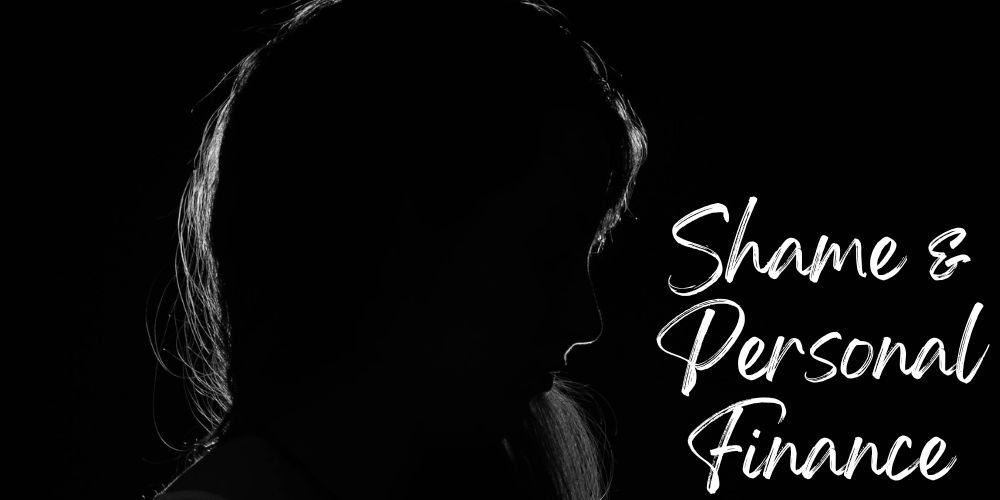It’s difficult to talk about your finances, especially if you feel shame about your money.
It’s tempting to sugarcoat the ugly truth
I know when I’m bitter at someone, I pretty much never say “I’m bitter at this person for hurting me”.
Rather, I usually say “I’m frustrated with them for how they treated me wrongly” or “They need to address their issue”
In reality, it’s a cover-up because I don’t want to admit my fault in the problem. I want to put it all on the other person. I think this can also be the case for our finances.
Experiencing Shame in Your Personal Finance
It’s so easy and tempting to blame bad financial decisions on circumstances that happened to you or on someone who made bad financial decisions on your behalf.
We can rack up credit card debt, take out an auto loan, and take on thousands of dollars in student loans before being able to legally drink.
As a result, so many young adults are burdened with so much debt and seemingly not enough income to cover it.

How the burden of debt can lead to feelings of shame
This feeling tends to lead to one of two financial paths.
The first is that the person ignores their financial situation and continues to go deeper into debt and accruing possessions.
The second is humbly admitting there’s a problem and resolving to fix it.
No matter the circumstance, admitting you’ve been going about something wrong and in a harmful way can be extremely difficult.
This is understandable. You make a financial decision – whether it’s taking out loans for school or charging a credit card for a vacation – that feels so right in the moment.
What we don’t often consider is how these financial decisions will impact our future.
Money Attitudes
I have found in talking with people that there are generally 3 attitudes toward personal financial matters.
1.Confidence. These people are usually aware of their financial situation and trying to get out of debt or continually learn to better manage their money
2. Avoidance. This can sometimes appear as confidence but usually seems to be rooted in insecurity. Maybe this person is aware of their financial situation, but it doesn’t look good and it feels like too much work to try to straighten things out. The result is not doing anything until the circumstances force them to address the situation.
3. Shame. I’ve known people who are ashamed of the financial situation they have gotten themselves into. Maybe there’s a feeling of being stuck, or that things will just never change.
While it’s understandable to feel shame about personal finances, it can perpetuate a cycle of bad money management.
If you feel ashamed every time you think about your finances or go to pay bills, the bad feeling that arises naturally leads to avoidance.
This may lead to a variety of results like overspending, avoiding looking at your bank account, or making a budget.
A Truth Perspective
If you don’t know where your money is going, then you lose out on opportunities to do things you may want to do like take a trip or give to organizations and missions.
I wonder if shame about personal finance is a form of spiritual attack. Finances can drive a wedge between spouses in a marriage between friends or between family members.
Shame is a Barrier
Shame is a barrier between us and God. When thinking about your financial situation, consider Romans 8:1 – There is therefore now no condemnation for those who are in Christ Jesus.
When we are in Christ, we do not need to be ashamed. I think this extends to things that seem as superficial as money.
If you are feeling shame about your financial situation, you are free in Christ. However, that doesn’t mean it’s helpful or healthy to just ignore your situation.

Humility
After recognizing you are free, it takes humility to admit money mistakes.
While your financial situation may be a mess, there is hope. Not only is there hope, but you can take action today beginning to straighten out your financial mess.
It’s okay to acknowledge shame about your debt. But it’s not okay to just let it sit there. Or worse, accrue more debt.
You are free in Christ. Let this apply to your finances as well.
Admit it. Repent. Accept forgiveness. Seek to change.
What To Do Next
As simple as it may sound, the first step to getting out of the shame trap is to humbly admit that’s where you are. From there, it’s time to create a concrete plan for how to handle finances going forward.
I encourage you to pray about your financial situation and reflect on the truth about shame towards it. God can use your financial situation for good.
Practical steps
1- Know Your Debt
If you have debt, then head over to “How to Pay off Your Debt” to get a handle on how your debt works.
After establishing how much debt you have and what type of debt it is, it’s time to build a budget to pay off debt and create a financial situation you can be confident about.
2 - Create a Budget
There are many different ways of establishing a budget. Some prefer the “snowball method” of ordering debts from smallest to largest and paying them off in that order.
Others prefer the “avalanche method” which is ordering your debts from highest interest rate to lowest interest rate.
I think either method or some combination of the two can work fine. What is most important is writing down your plan in a spreadsheet or document and adding goal end dates for each debt.
Either way, I show you how to set up a budget that fits you right here!
I hope this has encouraged you if you have ever felt shame about your financial situation!
What has helped change your perspective from shame or embarrassment about your finances?



